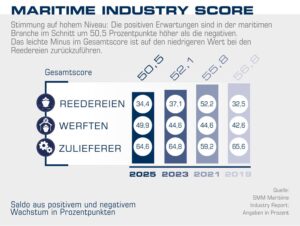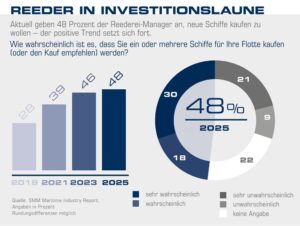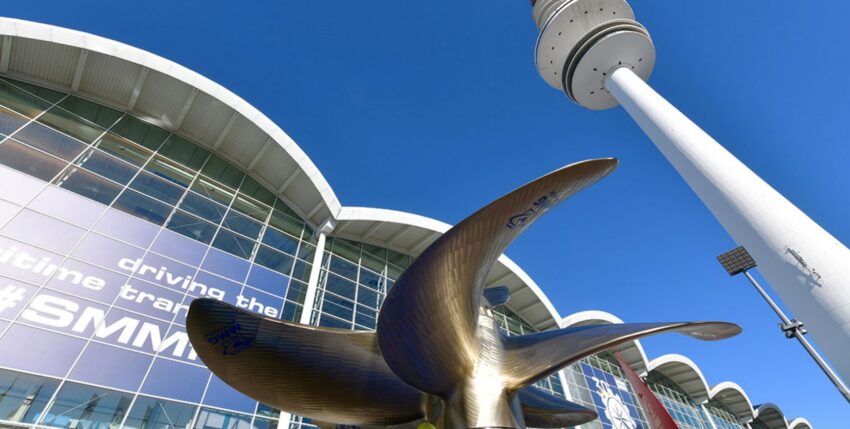The biggest concerns are the shortage of skilled labour, energy and bureaucracy
According to the latest SMM Maritime Industry Report (MIR), shipping companies and shipyards worldwide are planning extensive investments in efficiency, AI and fleet modernisation. One year before the world's leading trade fair SMM in Hamburg, the industry is confident and eager to invest, with 48 % of shipping companies planning new ship orders by 2026 - a record figure.
 What moves the maritime industry? Where do shipping companies, shipyards and suppliers see opportunities - and where are the challenges?
What moves the maritime industry? Where do shipping companies, shipyards and suppliers see opportunities - and where are the challenges?
Hamburg Messe und Congress (HMC) has analysed these questions together with the market research company mindline for the fifth time. The SMM Maritime Industry Report 2025 analyses the expectations of market participants regarding the development of shipping and shipbuilding every two years.
"The industry's growth momentum is unbroken - that is a strong signal in turbulent times," says Claus Ulrich SelbachVice President Exhibitions Maritime & Energy at HMC. With 50.5 points the Maritime Industry Score - which measures the difference between positive and negative market expectations - reached a clearly positive value (scale: -100 to +100). Despite a slight decline compared to 2023, the overall level remains high.
 For the first time, the study shows which challenges are of most concern to companies. Right at the top: Skills shortages, high energy costs and increasing regulatory requirements. "SMM 2026 specifically addresses these topics," says Christoph Lücke, Director SMM. The Maritime Career Market brings talents and companies together. Numerous exhibitors present solutions for increasing efficiency and saving energy. Classification societies and software providers provide support in implementing statutory environmental and climate requirements economically and practically. Sustainability remains a top topic. Six out of ten respondents expect increasing pressure to modernise their fleets in an energy-efficient manner. Data-driven solutions are particularly in demand - their relevance has increased by 13 percentage points compared to the last survey. Artificial intelligence is also gaining in importance and will once again be a key topic at SMM 2026. At the same time, companies are planning extensive investments in new hardware: 48 per cent of shipping companies are "likely" or "very likely" to order new ships by 2026 - a new high in the MIR
For the first time, the study shows which challenges are of most concern to companies. Right at the top: Skills shortages, high energy costs and increasing regulatory requirements. "SMM 2026 specifically addresses these topics," says Christoph Lücke, Director SMM. The Maritime Career Market brings talents and companies together. Numerous exhibitors present solutions for increasing efficiency and saving energy. Classification societies and software providers provide support in implementing statutory environmental and climate requirements economically and practically. Sustainability remains a top topic. Six out of ten respondents expect increasing pressure to modernise their fleets in an energy-efficient manner. Data-driven solutions are particularly in demand - their relevance has increased by 13 percentage points compared to the last survey. Artificial intelligence is also gaining in importance and will once again be a key topic at SMM 2026. At the same time, companies are planning extensive investments in new hardware: 48 per cent of shipping companies are "likely" or "very likely" to order new ships by 2026 - a new high in the MIR
SMM 2026: Platform for innovation and cooperation
SMM Director Christoph Lücke sees this as the perfect basis for the upcoming world's leading trade fair in Hamburg: "SMM 2026 brings together the global quality leaders of the maritime industry. It is not only a marketplace for technological innovations, but also a platform for cooperation and knowledge exchange, which will decisively advance the industry."
The world's leading trade fair for the maritime industry will take place in Hamburg from 1 to 4 September 2026. Over 2,200 exhibiting companies and around 48,000 participants from more than 100 countries are expected to attend. Covering around 90,000 square metres in twelve halls, SMM covers the entire value chain of the industry, brings together managers from all over the world and is the most important platform for innovations and the latest technologies in the maritime sector.
Under the motto "SMM - driving the maritime transition", the focus will be on the maritime energy transition and digital transformation from 1 to 4 September 2026. An attractive conference programme on open stages - accessible free of charge - and a wide range of networking opportunities will accompany the trade fair.
The SMM Maritime Industry Report is a key barometer of sentiment in the global maritime industry. The survey of visitors and exhibiting companies is conducted every two years by SMM organiser Hamburg Messe und Congress together with market research company mindline. This time, almost 1,500 managers from shipping companies, shipyards and suppliers took part - over a third more than in the last survey. 70 per cent of them are significantly involved in procurement decisions in their company







